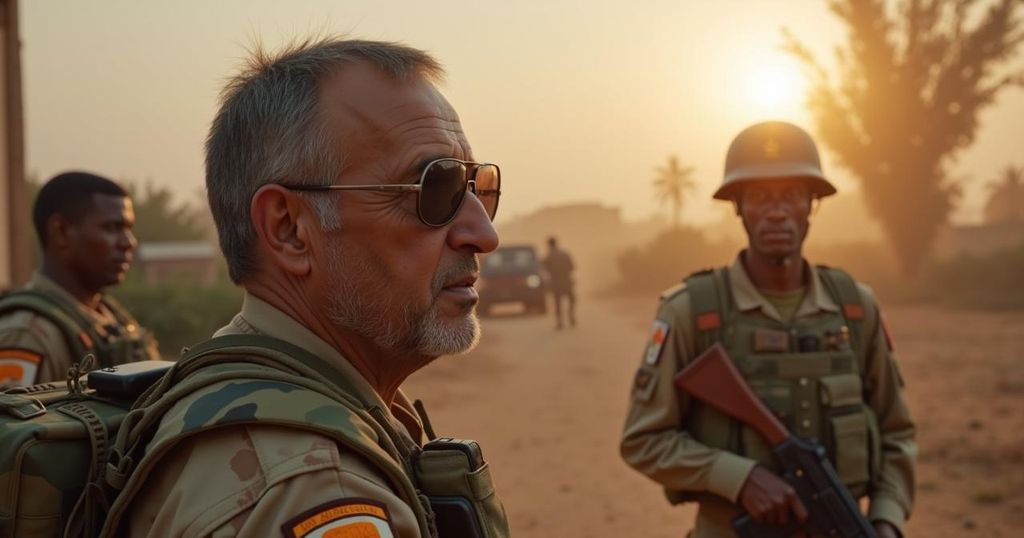Sudan’s Hemeti Accuses Egypt of Air Strikes Amidst Ongoing Conflict

Sudanese paramilitary leader Hemeti accused Egypt of conducting air strikes against his troops near Khartoum, which Egypt denied. Hemeti’s claims come amidst ongoing conflict between the RSF and SAF since April 2023, with significant humanitarian implications. Analysts suggest foreign intervention may be impacting the balance of power, while the conflict has displaced millions and caused widespread famine risks.
On Wednesday, Sudan’s Rapid Support Forces (RSF) leader, Mohamed Hamdan Dagalo, known as Hemeti, accused Egypt of conducting air strikes targeting his troops in the vicinity of Khartoum. In a recorded address, Hemeti stated that Egyptian aircraft executed a surprise attack on his forces stationed in the Jebel Moya area, asserting that his forces had maintained silence regarding Egypt’s involvement in the conflict in hopes of a withdrawal, but tensions had now escalated. The Egyptian government swiftly refuted these claims, with its foreign ministry urging the international community to corroborate Hemeti’s assertions. Hemeti went on to allege that Egypt has been supporting the Sudanese Armed Forces (SAF) with both training and weaponry, specifically drones, as the conflict between the SAF and the RSF continues to intensify since its inception in April 2023. Analyst Ammar Fayed remarked that Hemeti’s allegations suggest a shift in the balance of power, raising concerns about foreign intervention supporting the Sudanese army. The RSF and SAF have been battling fiercely over control of Khartoum, with reports indicating recent military successes for the SAF. Throughout the conflict, there have been allegations of Egyptian military assistance to the SAF, although analysts suggest that direct involvement may have receded amidst uncertainties regarding a decisive outcome for the army. Hemeti accused the Egyptian forces of deploying American-made bombs in their strikes, while alleging the presence of Iranian forces alongside the SAF. His comments followed U.S. sanctions imposed on his brother, who was accused of facilitating arms procurement for the RSF. In his address, Hemeti claimed that several foreign nations are backing the SAF, as he sought to reassure his forces of their resilience despite significant losses. He downplayed recent setbacks, emphasizing regrouping efforts and a potential return to previous territorial gains. The humanitarian impact of the ongoing conflict has been disastrous, resulting in over 10 million displaced individuals and widespread food insecurity across Sudan, with many areas facing the threat of famine. Recent diplomatic attempts to broker a ceasefire have failed to achieve meaningful progress, leading Hemeti to pessimistically predict the conflict’s endurance for several years. Accusations of atrocities have been leveled against the RSF, including unlawful killings and ethnic cleansing, prompting international concern regarding the human rights situation in Sudan.
The ongoing conflict in Sudan has emerged as a complex struggle between the Sudanese Armed Forces (SAF) and the paramilitary Rapid Support Forces (RSF). The RSF, a significant player in Sudan’s recent military history, has been embroiled in violent confrontations with the SAF since April 2023. This warfare has caused immense humanitarian crises, displacing millions and leading to escalating violence against civilian populations. International involvement has been a contentious topic as regional powers, including Egypt, have faced scrutiny regarding their alleged support for the SAF amidst these conflicts. Hemeti’s recent statements and accusations against Egypt highlight the intricate interplay of regional politics and military engagement in this protracted conflict.
In summary, Hemeti’s accusations of Egyptian airstrikes targeting RSF troops signify escalating tensions and highlight concerns over international military involvement in the Sudanese conflict. The ongoing warfare has resulted in catastrophic humanitarian impacts, with millions displaced and significant threats of famine confronting various regions in Sudan. As diplomatic efforts have stalled, there appears to be little immediate prospect for peace, leaving the nation caught in a cycle of violence exacerbated by foreign influence.
Original Source: www.middleeasteye.net








